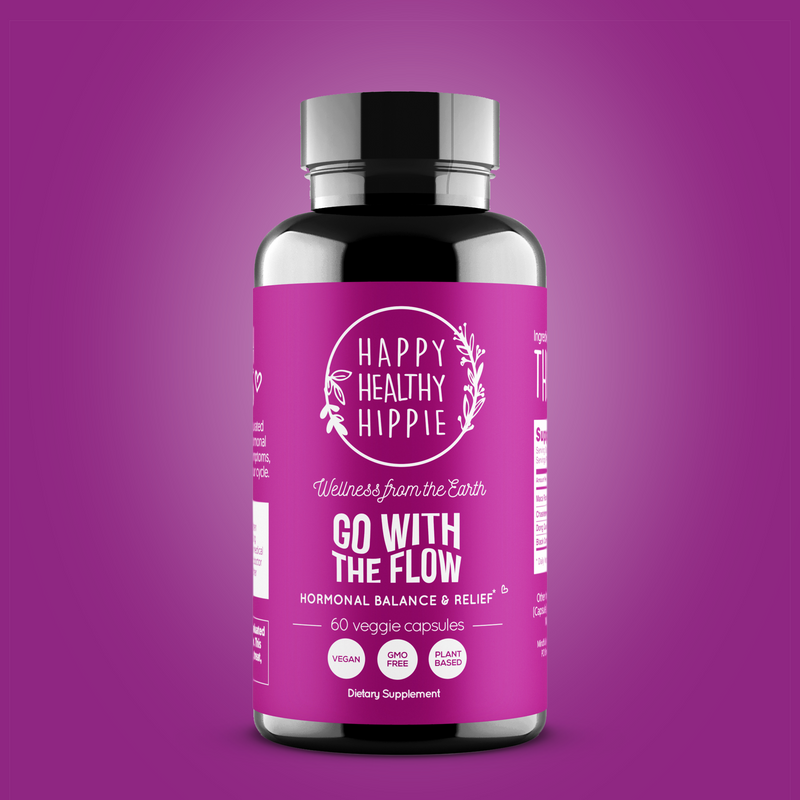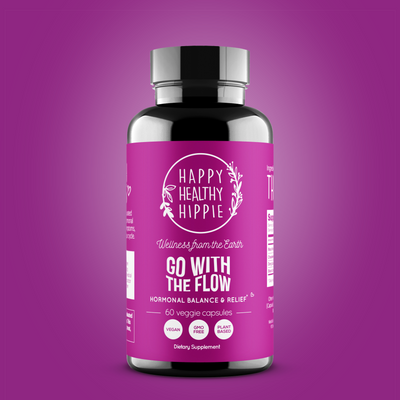
All around you — maybe even in your own backyard — there are everyday plants that double as adaptogenic herbs for perimenopause and menopause.
It may seem hard to believe that herbs and plants can be potent enough to address the effects of this natural, but at times stressful, transition that all women must go through.
Yet, that’s exactly what adaptogenic herbs can do.
The most powerful effects that adaptogenic herbs for perimenopause and menopause can offer you come down to the natural way they rebalance your hormones.
Wondering how?
Let’s take a look at 5 adaptogenic herbs you can use as a natural remedy for menopause and perimenopause and how they work.
What Are Adaptogenic Herbs?
Adaptogenic herbs are naturally-occurring plants that act as powerful health supports, providing total-body protection when you deal with stress, inflammation, fatigue, infection, and depression.
By definition, a root, herb, or plant can only be classified as an adaptogen if it exerts specific effects on the body. These include:
- Regulating levels of hormones, enzymes, proteins, chemical processes, and cell production and activity in the body
- Improving your overall health
- Bringing body functions back to their optimal states (not more or less)
- Alternating and optimizing endocrine functions (via the hypothalamic-pituitary-adrenal axis, which influences how hormones are released and controlled)
- Helping to maintain the body’s ideal homeostasis
There are different types of adaptogenic herbs you can use to address specific ailments.
For example, you can use energy-boosting herbs to skip your morning caffeine intake and still feel energized.
Similarly, you can take certain adaptogenic herbs for perimenopause and menopause to alleviate the everyday symptoms that many women experience due to hormonal changes during these transitions.
Let’s take a look at how they work.
How Do Adaptogenic Herbs Help with Perimenopause & Menopause?
Studies show that symptoms like night sweats and hot flashes, as well as the chills, insomnia, fatigue, vaginal dryness, slowed metabolism, and mood changes that accompany perimenopause and menopause, occur due to fluctuating hormone levels.
These hormones mainly include estrogen and progesterone, which are the primary reproductive hormones. However, perimenopause and menopause also affect hormones like cortisol, serotonin, dopamine, and insulin — to name a few.
These hormones play a role in everything, starting from sleep to blood glucose levels, immune defenses, digestion, regulation of the body’s temperature, weight gain, and more.
Adaptogenic herbs help by rebalancing these hormones to their optimal levels even as your body responds to decreases in estrogen.
For example, menopause-related insomnia occurs due to a drop in melatonin. That’s because melatonin is affected by changes in estrogen.
Well, adaptogenic herb supplements like reishi naturally help your body relax, induce sleep, and rebalance melatonin, thus regulating your sleep cycle. Better sleep also means your cortisol levels will remain balanced, so you won’t experience the fatigue or depression that often accompanies perimenopause and menopause.
5 Adaptogenic Herbs to Help with Perimenopause & Menopause
Let’s be honest — experiencing symptoms like hot flashes, night sweats, mood changes, and weight gain can completely upend the quality of your life. Not only is it stressful, but it can also feel as though you’re not in charge of your body anymore.
Instead, you’re playing second fiddle to your hormones, constantly at the mercy of whether they’ll act up for the day.
Well, it doesn’t have to be that way.
These 5 adaptogenic herbs for perimenopause and menopause transform this experience into something you can work with, control, and ease.
#1. Ashwagandha

Ashwagandha is also known as “Indian ginseng,” because it’s rooted in traditional Ayurvedic medicine. This leafy adaptogenic herb has been around for thousands of years assisting overall body calmness and wellness.
Well, science finally caught up and concurred: consistently taking this adaptogenic herb supplement can help you improve your resistance to stress. This means it works to boost your body’s immune and adrenal systems.
Other positive effects of ashwagandha for perimenopause and menopause include:
- Improving cognitive function and stabilizing your mood
- Supporting blood sugar levels, keeping your metabolism steady
- Reducing anxiety and depression
- Keeping your libido up (which usually takes a nose-dive during menopause)
#2. Black Cohosh Root

You can’t make an adaptogenic herbs list without black cohosh root. This “super” herb can help treat the most disruptive of perimenopause and menopause symptoms, including:
- Hot flashes
- Moodiness
- Vaginal dryness
- Excessive sweating
Just as ashwagandha works on cortisol, the stress hormone, black cohosh root targets estrogen — and all the symptoms women experience as it decreases during menopause.
Studies show that black cohosh root reduces the occurrence and intensity of hot flashes and night sweats - and this is just one of the ways in which it can ease the transition you’re going through.
It can also be used to address sleep disturbances, heart diseases in postmenopausal women, heart palpitations, decreased libido, and mood changes.
If black cohosh root sounds like it might be an effective remedy for the score of symptoms you’re experiencing, you can opt to take this adaptogenic herb supplement in one of two ways:
- As a separate supplement
- As part of Go With the Flow, a curated formula of herbs designed to address hormonal imbalance in women including menopause as well as PMS and PCOS. This gives you a full-spectrum of support.
#3. Korean Red Ginseng

Any type of ginseng is an excellent remedy for menopausal and perimenopausal symptoms. It’s a natural anti-inflammatory that has been in circulation for hundreds of years.
Variations like Panax or Korean red ginseng are finally receiving scientific attention because of their status as a “go-to” solution for menopausal issues. Korean red ginseng has been shown to significantly improve sexual function and global health in post-menopausal women.
Additionally, Korean red ginseng can help boost your energy, reduce stress, and decrease depression.
#4. Astragalus Root

Like all other adaptogenic herbs, astragalus root provides a whole range of total-body wellness effects that include combatting stress, decreasing cholesterol levels, and preventing diabetes.
However, when it comes to menopausal and perimenopausal symptoms, astragalus root is a staple. As a part of traditional Chinese medicine, astragalus root is proven to be effective against symptoms related to estrogen decrease, such as hot flashes and night sweats.
#5. Licorice Root

Time and again, studies around licorice root have shown that this adaptogenic herb for perimenopause and menopause is incredibly effective in reducing hot flashes and night sweats.
These symptoms receive the most attention because they’re the most disruptive and can become more severe and frequent if you don’t take steps to alleviate them. This woody-looking root also helps with estrogen-dominant cancers such as breast, ovarian, and prostate cancer.
Other Ways to Relieve Perimenopause & Menopause Symptoms
Taking adaptogenic herbs for perimenopause and menopause is just one option to relieve your symptoms.
Here are some other natural ways to do it:
- Incorporate foods that are rich in calcium and vitamin D. These foods will help offset some of the other effects of menopause, like the risk of osteoporosis. They can also help to improve heart health and your skin.
- Exercise adequately and consistently, because hormonal weight gain is a side-effect of menopause. Exercise will also tire you out, so you will start to sleep better and uninterrupted.
- Cut out refined sugar and processed foods as these are usually the cause of excessive weight gain, high blood sugar level, and a depressed metabolism. They also disrupt your energy levels, making you feel sluggish, but also overstimulated due to their high sugar content.
- Use supplements that contain phytoestrogens and other supportive compounds. For example, taking a daily probiotic, prebiotic, and evening primrose oil can help reduce menopause symptoms.
- Practice mindfulness-based stress reduction techniques for menopause, which are proven to help reduce stress, improve sleep, and reduce anxiety.
Perimenopause and Menopause FAQ
#1. Are Adaptogenic Herbs Good for Perimenopause and Menopause?
Yes, adaptogenic herbs for perimenopause and menopause can help alleviate some of the most uncomfortable symptoms. They can rebalance estrogen, cortisol, and other hormones, significantly reducing the effects of menopause.
#2. What Is the Best Adaptogenic Herb for Menopause and Perimenopause?
The best adaptogenic herb for menopause and perimenopause really depends on the symptoms you’re trying to address. Here are a few options:
- Take black cohosh root or licorice root if you’re trying to reduce the incidence and intensity of night sweats and hot flashes.
- Take Go With the Flow if you need to address multiple symptoms at once, including mood changes, depression, night sweats, and more.
- Take ashwagandha if you need to sleep better, reduce your stress, and feel more relaxed.
- Use Korean red ginseng if you’re trying to keep your libido and energy up.
#3. Do Adaptogenic Herbs Balance Female Hormones?
Yes, adaptogenic herbs can balance female hormones in addition to promoting better resilience and total-body wellness.
#4. How and For How Long to Take Adaptogenic Herbs?
The use duration of each adaptogenic herb depends on your body’s chemistry, its needs, and the dosage of the adaptogenic herb supplement that you’re taking.
Generally speaking, you should take adaptogenic herbs for perimenopause and menopause for a period of 3 to 6 months. Afterwards, it’s wise to take a break of up to two months. If your symptoms do reappear, you can return to your regular intake.
#5. Are Adaptogenic Herbs Organic?
Not all adaptogenic herbs are organic. The quality of these herbs and plants, as well as any other claims of potency and effectiveness, depend on the harvesting and manufacturing process that companies use.
Go With The Flow is a 100% plant-based supplement that supports you by:
- Menopause and PMS relief through herbal remedies
- Balancing hormone levels
- Providing mental & emotional relief
- Reducing bothersome physical symptoms (acne, bloating, etc.)
Try it risk free with our 60-Day Money Back Guarantee.
Key Takeaways
When it comes to adaptogenic herbs for perimenopause and menopause, here are the essential points to consider:
- You can’t go wrong with adaptogenic herb supplements. These natural plants and herbs have no side-effects and are proven to promote total-body wellness.
- Adaptogenic herbs go to work on the female body by rebalancing your hormones and ensuring that your organism is more resilient against inflammation, stress, insomnia, and infections.
- Adaptogenic herbs are only one part of relieving menopausal symptoms. Since you’re entering a new stage of life, you’ll also need to make other lifestyle changes. One example is improving your diet so that it supports your hormonal needs or exercising to keep your metabolism running strong.
And remember — it’s best to take adaptogenic herbs under the consultation of your family doctor or a functional medical specialist. These health professionals can monitor your progress and advise you on what to add, what dosage to take, and when it’s time to discontinue any adaptogenic herbs.


